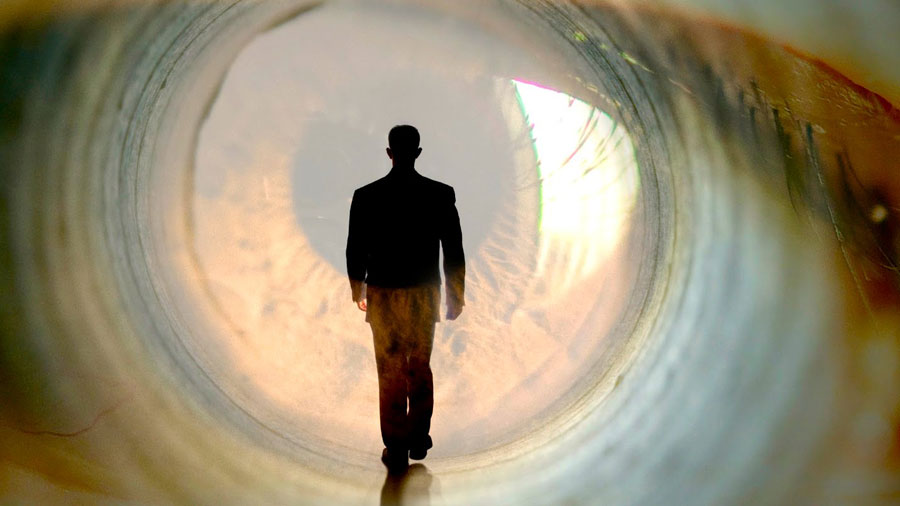Life On The Other Side: One Soul’s Experience

by Clyde Irion
It was closing time at the bar where Joe was a bartender. Somehow it had been an especially tough night and Joe was even more short-tempered than usual, cursing the inclement weather, his waiter who had quit, and his lot in general, as he quickly surveyed the scene before locking the door and walking out into the street. Although it was far past midnight the traffic was still very heavy. And Joe was in no mood to be tolerant of the cars and their drivers as they passed him, seeming not to care whether they hit him or not as he crossed at several intersections.
One driver especially Joe would have liked to tear limb from limb with his bare hands. And with his extremely powerful shoulders, arms and hands, he could have done it with little waste of time. He seemed almost blind with rage as he paused to hurl further invectives in the direction of the car that was already losing its identity in the heavy traffic.
As Joe quickly resumed his steps toward the curb, he suddenly became aware of a car bearing down on him much too speedily. He also heard the screeching of brakes. Like a crouching panther Joe sprang toward the curb. Time itself stood still; everything stopped-everything, that is, except that forebodingly awesome screeching of brakes. That hideous sound seemed to go on and on.
But Joe was almost as nimble and agile as he was powerful, and he made it clear of the onrushing car . . . . he thought. Nevertheless, a crowd of horrified onlookers gathered around a now limp and lifeless form. Joe was what the world calls dead.
He heard some comments to that effect but brushed them aside. He clearly remembered the onrushing car; but inasmuch as he was sure he had gotten out of the way in time, the incident somehow seemed far away and was now relatively unimportant, in spite of his tremendous anger at the time.
Joe went on home but was totally unprepared for what he encountered there. With a mixture of amazement and consternation he discovered that for some wholly illogical reason, his family either could not or would not recognize him. And he seemingly could not make himself heard.
As if that were not trouble enough, somebody got in touch with his family and succeeded in convincing them that he was dead. Their grief, together with his frustration at not being able to make them recognize him and convince them that he was alive, was almost more than Joe could bear. The whole world, and everybody in it, he thought, had suddenly gone completely mad.
Furthermore, Joe was bitter. He was a man who was hard and cold, cruel and ruthless in his attitude toward people and toward life. He was obscene and sordidly uncouth, and his years as a bartender had hardened him beyond any mortal hope of decency and respectability.
And now the whole worthless world, Joe thought, had suddenly gotten completely deranged and unhinged. Why in the name of God, if there is such a thing (which he doubted), had everybody, including his own family, apparently refused to hear what he tried to tell them, or even to recognize his presence?
Joe’s efforts to get through to his family and convince them that he was not dead remained futile. Filled with a mixture of anger and frustration, he started wandering around more or less aimlessly. He visited his old haunts, determined to find someone who would listen to him, whom he could convince that the rumour of his alleged death was totally without foundation. How could he be talking to them, or trying to talk to them, if he were dead?
Joe’s efforts and frustration both mounted. He did, however, begin to meet someone here and there who would talk to him; but oddly enough each of these persons was having the same trouble Joe was having. No one else would talk to them either. Out of a number of people he met in this way, he picked out two or three of his own kind and they wandered around, aimlessly.
Then one of his new companions deserted him. At least it seemed that way to Joe. Together they were berating their fate and the sorry, sordid affair they called life.
“You know,” the companion said, “after all the things that have been happening to me lately, I think I must be sort of mixed up, maybe about a lot of things.”
“Maybe you’re mixed up,” Joe retorted, “but I’m not! This whole crazy, miserable world we’re in is mixed up plenty, but not me.”
“Well, anyway,” answered the companion, “I think I’m about ready to say that I wish there was somebody I could talk to who could get me straightened out.”
Joe glanced away for a moment. At that very instant, almost from out of nowhere a stranger appeared and started talking to his companion. Where he had come from Joe could not be at all sure, but there he was, and Joe’s friend was listening to something the stranger was saying. Joe’s first reaction to the newcomer was one of contempt and dislike. After all, Joe didn’t like much of anybody, and he didn’t care particularly who knew it.
But then after a few moments, oddly enough, Joe’s feelings toward the stranger began to change slightly. He didn’t know what it was, but there was something altogether indescribable about the manner of the stranger. Joe wouldn’t admit to himself that he liked him, but he felt that he could tolerate him a little easier than he could most people.
After awhile Joe gathered that the stranger invited his companion to accompany him. Joe had no idea where they were going, but his companion indicated that, yes, he thought he would like to go. And that was the last Joe saw of him.
This wandering and frustrated bartender continued to drift from place to place, making new acquaintances. But it was always the same: only those would talk to him who, like he, had heard rumors of their own deaths. He continued to spend quite a bit of his time trying to convince his family that the story about his death was obviously false. But they ignored him as if he didn’t exist.
The days slipped into weeks and the weeks into months, although Joe was not aware of this. To him, time was not something that was going somewhere, like a wheel rolling along, making one turn for each day or week or month. He was aware that it existed; but his concern or consciousness did not include any idea of time standing still or going backward or speeding rapidly forward. It meant nothing to him, although he could not have explained why.
In terms of our calendar concept of time, however, about four months after Joe thought he had cleared the path of the speeding car a new door opened to him. He was extremely suspicious of that door at first, as would be anyone with Joe’s misanthropic background.
After an especially gruelling session of trying unsuccessfully to get some of his former cronies to extend to him some semblance of recognition, he became, very uncharacteristically, somewhat pensive. In this new mood a most remarkable thing happened to him. He was momentarily conscious of a fleeting wish for help, a desire for something or someone who could help him find an answer to his dilemma.
Suddenly his pensiveness was interrupted by someone walking slowly toward him.
“I have come in response to your desire for help,” the stranger said quietly.
Joe’s first reaction was to give this intruder a hard punch with his fist to get him out of the way. He had always prided himself on the fact that he needed no help from anyone. His own two fists were all he had ever required. But this reaction was followed instantly by a new wave of frustration at not being able to talk to, and being totally ignored by those people he most wanted to communicate with. Besides, Joe noted with strangely mixed feelings, something about this man would have prevented him from using his fists any way.
“How can I help you?” the stranger asked. “If it’s any business of yours,” Joe retorted, recovering his usual insolence, “I wanna be able to talk to people, and have them talk to me!”
“Perhaps that can be arranged,” the stranger replied, still quietly, unmoved by Joe’s antagonistic attitude.
“What d’ya mean, arranged? Since when do I have to arrange to talk to people? I’ve been quite a talker all my life, and nobody hadda arrange for me to do any talkin’. Now this crazy thing has happened, and I keep on tryin’ to talk to people, but nobody will talk to me – except a few guys here and there that are havin’ the same trouble that I am.”
“And would you like to talk to some people who are not, as you say, having the same trouble you are having?”
“Well, cripes, what do you think? I wouldn’t be wastin’ my time talkin’ to you if I didn’t, would I?” “If I arrange for you to talk to some people I know, perhaps they can help you find your answer,” volunteered the stranger. “I don’t need any help!” Joe snapped. “Except to find out what’s goin’ on around here. Can you tell me that?”
“Come with me.”
The quiet, reassuring and soothing calmness of this man was wholly foreign to one of Joe’s make-up. Ordinarily Joe would have brushed aside such a person with a contemptuous gesture and a few insolent words. But he was conscious of two motivating forces within him, almost as if he were two persons instead of the one he had always known himself to be, as if another part of himself – a strangely unfamiliar part – was saying, commandingly but calmly, “You are to go with this man. It is what you have been preparing for. Go, and do as he bids you.”
Amazingly, Joe trusted this unfamiliar voice. Almost unquestioningly he turned and followed the stranger who spoke with the calm reassurance Joe instinctively knew he needed.
Read The Profit And Loss of Dying – full pdf story of Joe here.
Posted in Life On The Other Sidewith comments disabled.





